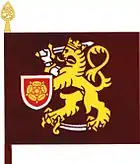 | |
| Type | Public |
|---|---|
| Established | 1993 |
| Rector | Major General Mika Kalliomaa |
| Students | 850 (academic degree) 1,000–1,300 (courses) |
| Location | , |
| Campus | Santahamina |
| Flag |  |
| Affiliations | ISMS; IAMP |
| Website | http://www.mpkk.fi/ |
The Finnish National Defence University (Finnish: Maanpuolustuskorkeakoulu, MPKK, Swedish: Försvarshögskolan) is a military university located in Helsinki. The university trains officers for the Finnish Defence Forces and the Finnish Border Guard. The main campus is located in Santahamina, Helsinki.
Prior to 2007, the school referred to itself, in English, as the National Defence College.
History
The first army officer school in Finland, then part of Sweden, was Haapaniemen sotakoulu, which was founded by Georg Magnus Sprengtporten in 1780 in Kuopio and relocated to Rantasalmi in 1781. Initially, it was established to train officers for the Savo Brigade of the Swedish Army, but soon it began to recruit cadets from all of Finland. The school continued operation even after the Finnish War in 1809, where Finland was ceded to the Russian Empire. However, in 1818, a fire broke out in the building, and the school was moved to Hamina to become the Hamina Cadet School.
The Hamina Cadet School was trained officers for the Russian Empire. It was abolished on July 24, 1903[1] under the influence of various orders given during the first period of repression of Finland by the Russian Empire.
After independence, the Finnish officer training was always divided among three schools until 1992: initial education at the Kadettikoulu ("Cadet School", abbreviated KADK,[2] founded in 1919), General Staff Officer Training at the Sotakorkeakoulu ("War College", founded in 1924), as well as continuous training at the Taistelukoulu ("Battle School", founded in 1927). From the beginning of 1993, all of these schools were merged into the National Defence University, one of the largest colleges of higher education for officer education.
In 2001, the Maanpuolustusopisto (a military junior college) in Lappeenranta was decommissioned, but the school was immediately repurposed to provide freshman and army training for the National Defence University, as the Army Academy (Finnish: Maasotakoulu, "Land Warfare School").
Rectors of the National Defense University
| Rank | Name | Term |
|---|---|---|
| Kenraalimajuri | Antero Karvinen (born 1934) | 1993-1994 |
| Kontra-amiraali | Esko Illi (born 1945) | 1994-1996 |
| Kenraalimajuri | Seppo Tanskanen (born 1941) | 1997-2001 |
| Kenraalimajuri | Aarno Vehviläinen (born 1944) | 2001-2004 |
| Kenraalimajuri | Pertti Salminen (born 1954) | 2004-2009 |
| Kenraalimajuri | Vesa Tynkkynen (born 1954) | 2009-2013 |
| Kontra-amiraali | Veijo Taipalus (born 1958) | 2013-2015 |
| Kenraalimajuri | Ilkka Korkiamäki (born 1960) | 2016-2018 |
| Kenraalimajuri | Jari Kallio (born 1961) | 2018-2021 |
| Kenraalimajuri | Mika Kalliomaa (born 1966) | 2021- |
Degrees
It is possible to get the following degrees in the National Defence University:
- Bachelor of military science
- Master of military science
- Senior staff officer's degree
- General staff officer's degree
- Doctor of military science
Departments
- Department of Leadership and Military Pedagogy
- Department of Warfare
- Department of Military Technology
Locations
Service branch schools
The following establishments are responsible for the branch- or service-specific education of the students:
- Air Force Academy, Tikkakoski
- Army Academy, Lappeenranta
- Armour School, Hämeenlinna
- Artillery School, Niinisalo
- Engineer School, Lappeenranta
- Infantry School, Lappeenranta
- Signals School, Riihimäki
- Naval Academy, Helsinki
- Border and Coast Guard Academy, Espoo & Imatra (part of Finnish Border Guard)
- Logistics School, Riihimäki (part of Defence Forces Logistics Command)
Besides these, Military Museum of Finland, National Defence Courses departments and the National Defence University Library operate under National Defence University.
References
- ↑ Laati, Iisakki (1950). Mitä Missä Milloin 1951. Helsinki: Kustannusosakeyhtiö Otava. p. 134.
- ↑ "Lyhenneluettelo". Kotimaisten kielten keskus. 7 January 2013. Archived from the original on 12 October 2013. Retrieved 17 October 2019.
